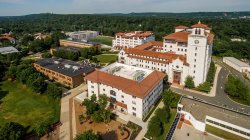Dr. Helenrose Fives Surveyed NJ Districts on Distance Learning
Posted in: College News and Events

Dr. Helenrose Fives, Professor in the Educational Foundations Department, was recently featured in the American Psychological Association Monitor, a special report on distance learning.
The article stated, “When schools closed abruptly, teachers were forced to design remote-learning plans quickly. The plans they created were all over the map, says Helenrose Fives, PhD, a professor of educational foundations at Montclair State University and president of APA’s Div. 15 (Educational Psychology). In late March, Fives and colleagues began surveying teachers about their experiences with distance learning in New Jersey—a state with a staggering 584 school districts.
‘It seems like every district is doing something different. The variability in how districts are approaching this is shocking,’ she says.
Even within a single district, student experiences are wide-ranging. Teachers and parents have reported that some kids are thriving with fewer social distractions, or have been energized by their newfound independence. Yet many other children lack devices or reliable access to the internet. And while some families have parents who can oversee their children’s remote learning, many youths are caring for younger siblings while their parents work in essential jobs or living with the chaos of unemployment or homelessness.”
About her research in general, Dr. Fives notes, “At the core of my research agenda is the firm belief that teachers matter. That is, the roles they play within society, by shaping the cultures of individual classrooms, schools, and in national discourse, matter greatly to the well-being and success of our communities. I enact this belief by finding ways to support teachers’ work. However, to support teachers’ practice also means understanding teachers, in particular, their beliefs and motivation, knowledge, epistemic cognition, and how they develop teaching expertise. Further, these areas work in tandem to support or hinder teachers’ development and well-being. The primary foci of my research agenda include investigations into: Teachers’ Beliefs, Motivation, and Knowledge; Classroom Assessment; Epistemic Cognition; and Expertise Development.”
